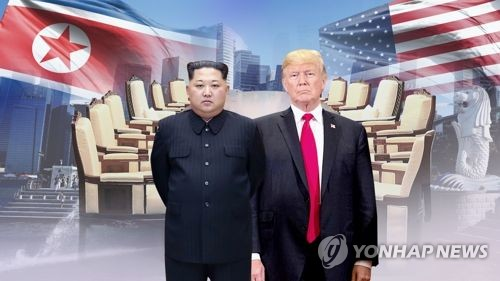Ahead of a potential summit between Donald Trump and Kim Jong-un, their negotiators are trying to hash out details over an array of hitherto intractable issues, including denuclearization methods, timelines and security assurances for the isolated regime.
A flurry of working-level talks over the past few days have raised cautious optimism for a denuclearization deal, which would also significantly affect the leaders' political fortunes at home and their images abroad.
But it still remains uncertain whether the longtime foes will find common ground ahead of their historic summit likely to occur on June 12 in Singapore.
"Trump and Kim may strive to craft a win-win solution that would not compromise the international nuclear non-proliferation regime, and would satisfy them in light of their domestic political gains," Nam Chang-hee, a diplomacy professor at Inha University, told Yonhap News Agency.

"But to achieve the complete denuclearization (of the North) may take more time than expected," he added, pointing to a complicated disarmament process that may call for the dismantlement of Pyongyang's "past, present and future" nuclear arms.
Facing midterm elections in November and a presidential vote in 2020, Trump has been pushing for a swift and stringent disarmament of the North, which would apparently also involve the destruction of chemical and biological weapons and ballistic missiles.
As part of its efforts for a "complete, verifiable and irreversible" denuclearization, Washington has demanded Pyongyang ship an estimated up to 20 nuclear warheads overseas at an early date, Japan's Kyodo News reported on Monday.
Estimates vary as to the size of the North's nuclear stockpile.
According to Seoul's 2016 defense white paper, the North possesses 50 kilograms of plutonium -- an amount that could yield up to 10 nuclear warheads. Some estimates put the number at up to 60 kg.
"Washington's concept of complete denuclearization targets all of the North's programs related to its fissile materials, nuclear production, enrichment, storage and research facilities," a government researcher said, declining to be named.
"So the key issue in the bilateral negotiations will be to what extent the North would accede to the U.S. demand," he added.
During the two inter-Korean summits on April 27 and May 26, the North Korean ruler affirmed his intention for the "complete denuclearization" of the peninsula. But he is unlikely to relinquish his nuclear arsenal before Washington offers sustainable security guarantees, observers said.
Pyongyang, with an ill-equipped conventional military force, has long regarded its nuclear arsenal as principal means to counter "U.S. hostility" and ensure its regime's security.
One of the North's key concerns is the likelihood of any deal being reversed after a change of government in Washington.
"The North's distrust towards the U.S. might have been amplified, as it has witnessed Trump scrapping many deals that the preceding Barack Obama government had clinched, such as the climate change accord, the Trans-Pacific Partnership and the Iranian nuclear deal," Kim Tae-hyun, a diplomacy professor at Chung Ang University, said.
To address the North's security concerns, U.S. Secretary of State Mike Pompeo has said that Washington would seek security assurances for Pyongyang "in the same way we are demanding a permanent, irreversible denuclearization."
The secretary has also hinted that the U.S. government would seek to gain congressional approval for any deal with the North to make it permanent.

